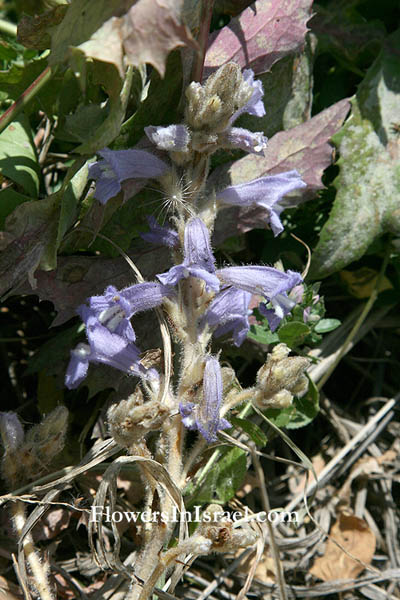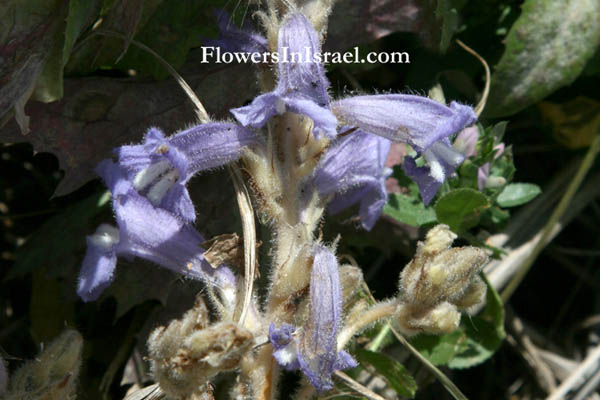Hebrew: עלקת מצרית, Arabic: هالوك مصري
| Scientific name: | Orobanche aegyptiaca Pers. | |
| Synonym name: | Phelypaea aegyptiaca (Pers.) Walpers | |
| Common name: | Egyptian broomrape | |
| Hebrew name: | עלקת מצרית | |
| Arabic name: | هالوك مصري | |
| Family: | Orobanchaceae, Broomrape family, עלקתיים |

|
| Life form: | Parasite | |
| Stems: | 15-50x0.4-0.6cm; usually branched | |
| Leaves: | Alternate, scale | |
| Inflorescence: | Spike very lax and flowers often remote | |
| Flowers: | bracts shorter than calyx; corolla 20-35mm, Violet; lobes of the lower lip broadly ovate to orbicular, obtuse; filaments basally hairy; anthers basally and at suture numerous hairy. | |
| Fruits / pods: | Capsule 6-7mm | |
| Flowering Period: | February, March, April, May | |
| Habitat: | Batha, Phrygana | |
| Distribution: | Mediterranean Woodlands and Shrublands, Semi-steppe shrublands, Shrub-steppes, Deserts and extreme deserts, Montane vegetation of Mt. Hermon | |
| Chorotype: | Irano-Turanian | |
| Summer shedding: | Ephemeral |

Derivation of the botanical name: Orobanche, Greek orobos, a kind of vetch; anchone, choke, strangle; this was the Greek name of a plant that was parasitic on vetch. aegyptiaca, Egyptian. Phelypaea, honors Louis Phélypeaux (1643–1727), marquis de Phélypeaux (1667), comte de Maurepas (1687), comte de Pontchartrain (1699), known as the chancellor de Pontchartrain, a French politician, and his son Jérôme Phélypeaux (1674 – 1747), both having materially aided Joseph Pitton de Tournefort (1656 – 1708), a French botanist, in his scientific work and travels. broomrape, broom + rape, part translation of species name Orobanche rapum-genistae, where Latin rapum actually means turnip, not rape. Broomrape, any of various plants, of the genus Orobanche, that are parasitic on the roots of other plants. The Hebrew name: Alkat, עלקת, is derived from the name of the parasitic animal leech, עלוקה, aluka.
|